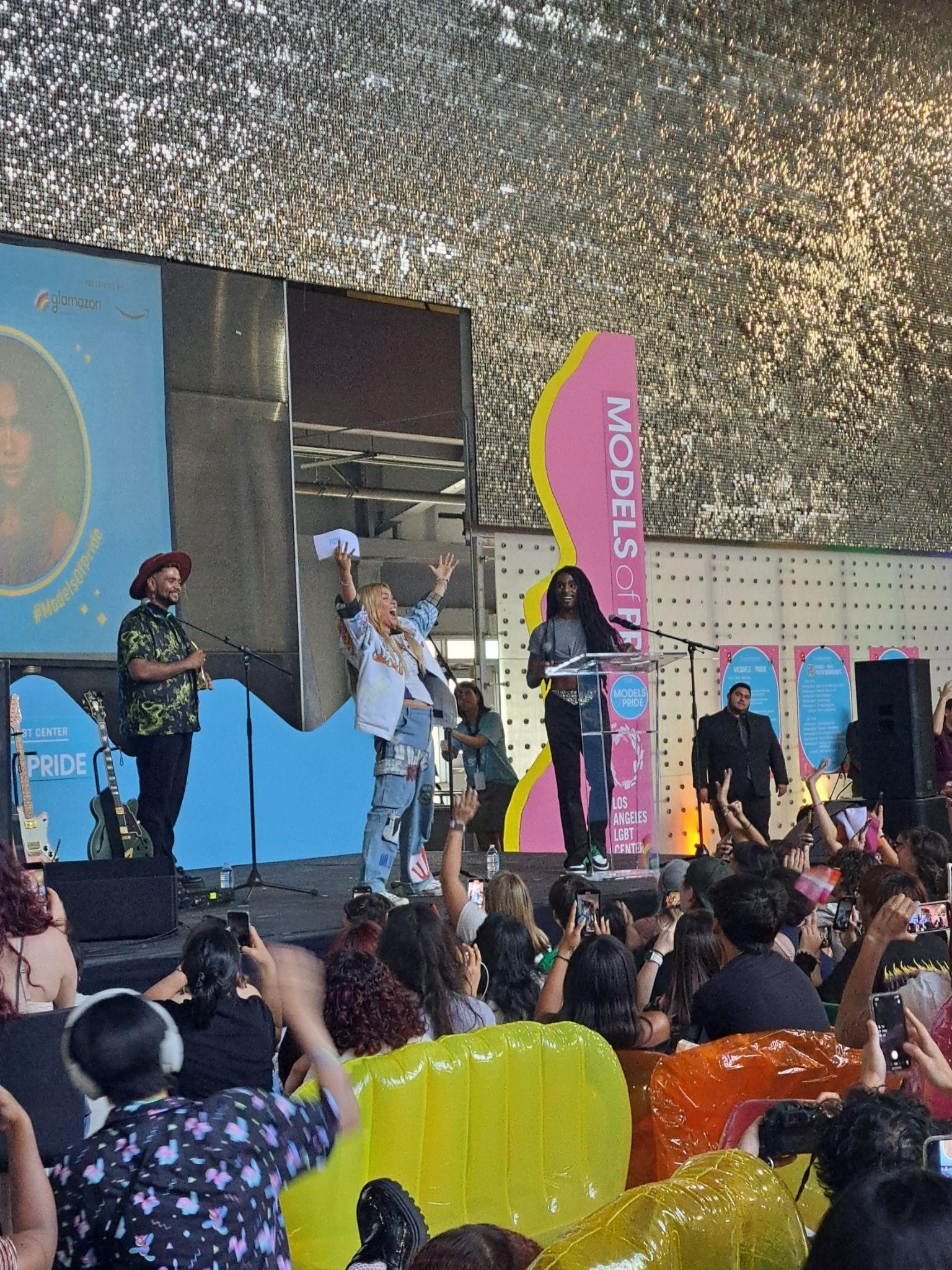Photo by Ava Rosenberg/OutWrite
On Saturday, October 14, the Los Angeles LGBT Center had their 31st Models of Pride, an event meant to offer a safe space for LGBTQ+ youth and expose them to queer role models. The event included workshops on topics such as sensory art, voguing, and “Dungeons and Dragons” for participants to attend in between speakers (including keynote speaker Dylan Mulvaney!) The main event space — located at the California Science Center — had a welcoming display of colorful inflatable chairs and booths from queer organizations and popular brands like NYX Cosmetics.
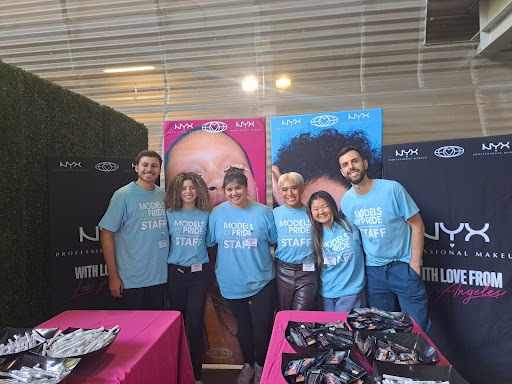
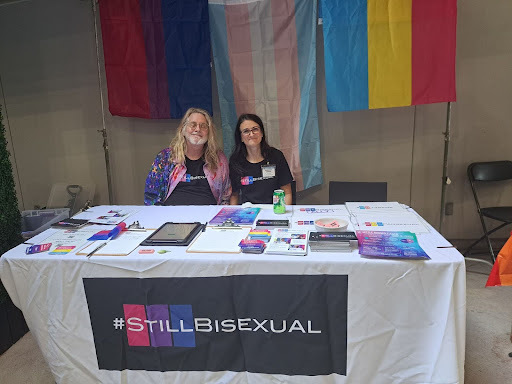
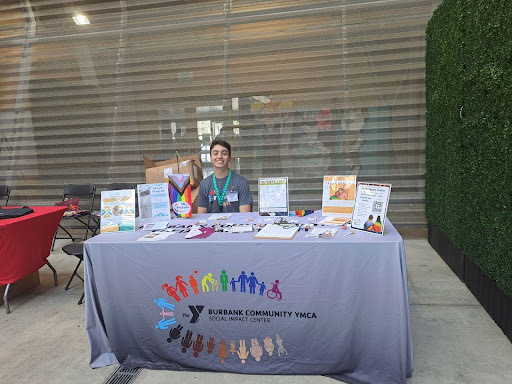
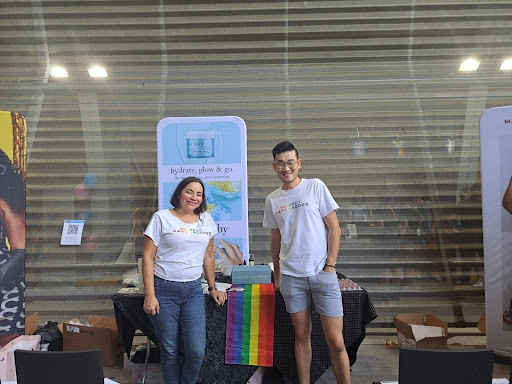
The Philosophy booth was giving away free samples of skincare.
There was also an outdoor area with bounce houses and food trucks for which attendees were given a free ticket upon entering. The space was incredibly welcoming with activity tables for attendees to gather at, such as air dry clay and friendship bracelet making.
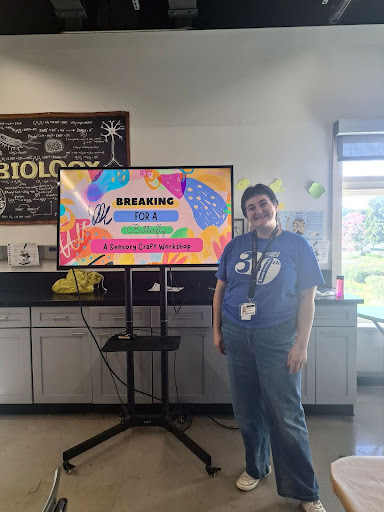
After Wolfe’s workshop (pictured above), it was time to quickly head back to the main stage to see queer pop icon Hayley Kiyoko — colloquially referred to as “Lesbian Jesus” — perform. Kiyoko was confident, down to earth, and as kind and relatable in person as one might expect. Before starting her performance, she said to the eager crowd: “Growing up, I really struggled to find my community, and it’s been a really beautiful journey to see music helping me find my community and my voice. I just wanted to take a moment to thank all of you for all of your support and love.” She played three songs, finishing with fan favorite “Girls Like Girls,” which, of course, most of the LGBTQ+ youth in attendance sang along to. Personally, it was a full circle moment because when I first heard it in 2015 or 2016, it was the first piece of mainstream media I saw — or at least the first that stuck with me — that showed lesbianism in such a positive light.
Before she left the stage, Kiyoko ended by saying, “I love being a lesbian. I just want to encourage you all to love yourselves, to show up for yourselves, to show up for one another because you are so worthy and deserving of love, and I am rooting for you.” A few attendees were allowed to ask questions after the performance, and one child, who was about 10 years old, asked a question about parental acceptance when coming out. In her response, Kiyoko touched on her own experience with her parents, saying “When the world started celebrating me and loving me for who I was, my parents felt like ‘Oh wow, she can thrive and have a wonderful life’ and that’s when their support really turned around. So I think for anyone who’s struggling with that, if you do have parents who aren’t supportive, look around you. Look at this incredible family that you have here. And you can always find that support if it’s not under the roof that you’re born in.”
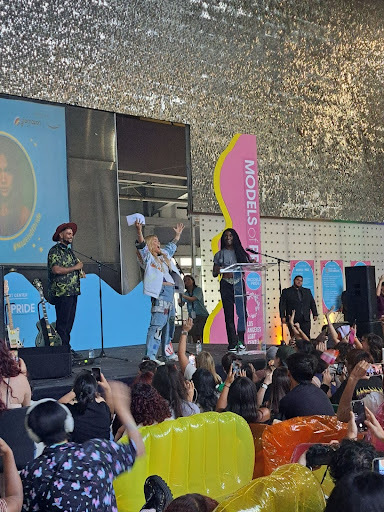
After watching Kiyoko perform, I met up with Polly Kim, whom I’d met entirely by chance on the train to the event (It turns out being gay and late to everything works out sometimes). Kim works with PFLAG, and she’s an eighth-grade science teacher at the Brentwood School and the leader of the school’s Pride Project Family Association. We spoke about her work with PFLAG, how to be a supportive parent to a queer child, and more:
Ava Rosenberg: Can you talk about your involvement with the queer community overall?
Polly Kim: Sure. My daughter, who’s 27, came out when she was about 15. When she was in high school, she wanted to join her [Gender Sexuality Alliance] (GSA), and she thought she’d better tell her dad and I before she told other kids. So, she came out to us with a note saying “I’m still the same person, but here’s something new you don’t know about me. I’m gay.” So I decided I wanted to join some kind of group of other parents to get to know other people who had an LGBTQ+ person in their family and to get resources. I heard about PFLAG, and I joined, and it’s been really good. We used to have monthly meetings in person in Westwood at a church, and I started going to Models of Pride with my daughter and marching in the Pride parade. So my involvement is really because of my daughter, and she and PFLAG have taught me so much about the LGBTQ community.
Ava: That’s amazing. Can you talk about the work that PFLAG does?
Polly: Sure. One of our main things is having monthly meetings, and right now, they’re on Zoom. We have a general monthly meeting, a Spanish monthly meeting, and we have a meeting that we call “Gender Focus,” which is mostly people whose children are transitioning, transgender, or non-binary, but any family or people can come to the general meeting as well. So a lot of it is support for families. It doesn’t have to be parents — family members, friends, and LGBTQ people themselves are welcome to come to our meetings. And then we also have a group that goes out to schools called the “Speaker’s Bureau.” In the past, we’ve done a lot of speaking in person at high schools and colleges, the police department, and different companies, and then we just do general advocacy and education. We have a website with a lot of resources — pflag.org is the national one, and pflagla.org is our local Los Angeles one.
Ava: That sounds like some great work. What advice would you give to the families of LGBTQ+ children who have recently come out?
Polly: The main thing is unconditional love. Let them know that you love them just as much. You want to support them; you’re there for them. Ask them if there’s anything they want from you. I know that when my daughter came out, I started driving her around to other schools whose GSAs were having events and just getting to know other LGBTQ people in the LA area because there weren’t that many out people at her school even though her school was very welcoming and had a GSA. Parents should educate themselves, and one way is through PFLAG and other organizations like the LA LGBT Center. There are a lot of books and websites too. I’d say parents shouldn’t start asking a whole bunch of questions to the kid. That’s not the kid’s job to educate the parents on what it’s like to be gay, bi, pan, or whatever the child identifies as. Parents should try to educate themselves and just ask the child, “What support do you need from me?”
Ava: Thank you so much. Is there anything you want to add?
Polly: Just that everyone’s welcome [at PFLAG]. LGBTQ people, parents, friends, allies — and it’s okay if you’re not okay. The people we really need to reach are people who may feel guilty because they’re not all excited about their child being gay. They may wish their child wasn’t transgender, and they may be having conflicts with their religion or conflicts with their upbringing. It’s okay. We don’t judge when parents come in; we try to help them. Sometimes people cry, and sometimes people are happy and fine. Everyone is welcome to come. We have resources on our website, and we also have our Zoom meetings.
Overall, Models of Pride was a beautiful, welcoming space for LGBTQ+ youth and adults alike. Aside from all of the wonderful speakers and activities, the energy and sense of community among attendees was what made the event memorable. Models of Pride offers a unique and inclusive opportunity for youth to see the queer role models they look up to in a more accessible way than the traditional concert or conference — admission is free, and there are quiet rooms for people with sensory issues to take breaks. Given the recent negativity of most media coverage on the queer community, I think it’s more important than ever to have events like Models of Pride that showcase the beautiful, inspiring people in the community who keep us going even when it can feel like the world is against us.
Stay tuned for an interview with influencer Dylan Mulvaney, which will be covered in an upcoming article.
Credits:
Author: Ava Rosenberg (She/They)
Artist: Ava Rosenberg (She/They)
Copy Editors: Michel W (He/Him, Bella (She/Her)

